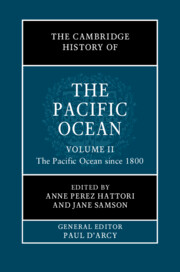Book contents
- The Cambridge History of the Pacific Ocean
- The Cambridge History of the Pacific Ocean
- The Cambridge History of the Pacific Ocean
- Copyright page
- Contents
- Figures
- Tables
- Contributors to Volume II
- Frontispiece
- General Editor’s Introduction
- Preface to Volume II
- Part VII Rethinking the Pacific
- Part VIII Approaches, Sources, and Subaltern Histories of the Modern Pacific
- 37 Archives and Community Memory in the Pacific
- 38 Missing in Action
- 39 Rethinking Gender and Identity in Asia and the Pacific
- 40 Fifty Years of The Hawaiian Nation
- 41 Pacific Literature and History
- 42 Film and Pacific History
- 43 The Visual and Performing Arts of the Pacific
- Part IX Culture Contact and the Impact of Pre-colonial European Influences
- Part X The Colonial Era in the Pacific
- Part XI The Pacific Century?
- Part XII Pacific Futures
- References to Volume II
- Index
37 - Archives and Community Memory in the Pacific
from Part VIII - Approaches, Sources, and Subaltern Histories of the Modern Pacific
Published online by Cambridge University Press: 11 November 2022
- The Cambridge History of the Pacific Ocean
- The Cambridge History of the Pacific Ocean
- The Cambridge History of the Pacific Ocean
- Copyright page
- Contents
- Figures
- Tables
- Contributors to Volume II
- Frontispiece
- General Editor’s Introduction
- Preface to Volume II
- Part VII Rethinking the Pacific
- Part VIII Approaches, Sources, and Subaltern Histories of the Modern Pacific
- 37 Archives and Community Memory in the Pacific
- 38 Missing in Action
- 39 Rethinking Gender and Identity in Asia and the Pacific
- 40 Fifty Years of The Hawaiian Nation
- 41 Pacific Literature and History
- 42 Film and Pacific History
- 43 The Visual and Performing Arts of the Pacific
- Part IX Culture Contact and the Impact of Pre-colonial European Influences
- Part X The Colonial Era in the Pacific
- Part XI The Pacific Century?
- Part XII Pacific Futures
- References to Volume II
- Index
Summary
Dynamic and proactive archives are crucial for safeguarding and growing community memory and knowledge. Despite this, South Pacific Island archives are plagued by stark challenges which hinder their role. Principally, it is an issue of trust. The echoes and expectations of a not-too-distant colonial past have isolated archives from the communities they are supposed to serve. This is made worse by traditional archival practice, which has a narrow focus, and with characteristics and requirements that prevent Pacific archives from connecting with their communities. These dated archive practices concentrate on ‘control’ of archival holdings with less consideration for the ‘accessibility’ of these holdings to the general public. This is driven by assumptions that may be relevant in Europe and societies where the written record has a long history, but which do not fit the realities of the island nations of the South Pacific and other countries that are former colonies, where oral tradition has a more dominant role. Using the developments at the National Archives of Fiji from 2012 to 2019 as a case study, this chapter will examine the challenges to Pacific Island archives, reveal how acknowledging cultural norms is key for Pacific archives to build trust and establish relevance in the community, and demonstrate how connecting with community is critical to overcoming the obstacles which prevent archives from serving their communities as desired.
- Type
- Chapter
- Information
- The Cambridge History of the Pacific Ocean , pp. 167 - 190Publisher: Cambridge University PressPrint publication year: 2023

